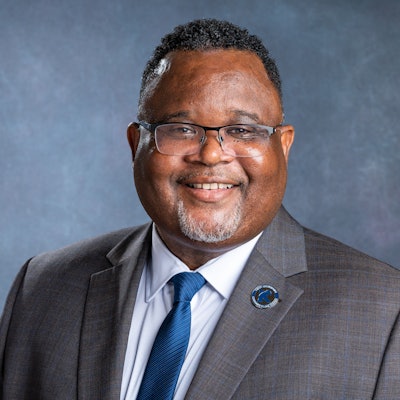Education is never without its controversies, and some of the more recent debates seem directly tied to the lack of diverse voices at all levels of our educational system in this country. Terms like Critical Race Theory are reduced to polarizing buzzwords as some fight to prevent an honest examination of our society and its roots. In my view, debating subjects of historical and social significance from varying perspectives can help us reach a common understanding of our shared history and move forward together.
Since I became President of Kean University in July of 2020, I have been actively seeking ways to elevate diverse voices and promote inclusivity and belonging within the Kean community. A key moment occurred early in my tenure when I was talking to students about their academic experiences. Their request was clear: Hire more faculty who look like us. Hire faculty who can represent, and relate to, our life experiences.  Dr. Lamont Repollet
Dr. Lamont Repollet
People of color make up 63% of the student body at Kean University. Several years ago, we were designated by the federal government as a Hispanic-serving institution because more than 25% of our student body identifies as Hispanic. Many of our students are immigrants, or children of immigrants, and are the first in their families to attend college.
I have long celebrated our diverse student body. In fact, it was a big part of why I fell in love with Kean in the first place as a graduate student. But that pivotal conversation with students led me to examine the diversity of our faculty at Kean, and the results left me unsatisfied. While our student population at Kean is incredibly diverse, only 8% of our faculty are Black and only 9% are Hispanic.
Sadly, this dilemma is not unique to Kean. A 2019 study by the Pew Research Center found that in the United States only 5% of faculty members were Hispanic as compared to 20% of undergraduates overall. African Americans made up 6% of faculty while 14% of students were African American. And we know that race is just one aspect of equity work— for our faculty to truly reflect the diversity of our student body and our world, we must welcome faculty members who are part of the LGBTQIA+ community, who are disabled, and who break traditional barriers, like women in STEM fields, to name just a few.
It was clear to me that we needed to take action. Too often conversations around equity amount to just that—conversations. Such conversations are important and necessary, but not sufficient. Through the collective bargaining process, my administration negotiated with our faculty union to establish a targeted program to recruit faculty from diverse communities and backgrounds. Academia is notoriously insular, and completing a graduate degree requires time, money, and support that are often not available to those from historically excluded groups. Even for those who overcome the obstacles and achieve junior faculty status, a sense of acceptance and belonging within academic circles often remains elusive.
To address some of these challenges, we welcomed our first cohort of Equity in Action fellows to campus in September 2020. The fellowship seeks to recruit scholars who might otherwise be excluded from consideration by focusing on potential rather than output, and valuing life experience outside the traditional academic track. Our inaugural class of six includes experts on disability history, architecture, mathematics and electrical engineering, and entrepreneurship, to name a few. Each scholar receives mentorship in teaching, research, and acclimating to academia to ease their transition to a world that was not constructed with them in mind. At the conclusion of the two-year fellowship, these scholars will advance into tenure-track positions with the confidence and experience that come with robust mentorship, meaningful professional learning, and support from the entire university community.
We are now in the process of recruiting for the next academic year. It is the first step in a longer journey toward a faculty as richly diverse as our student body. We have a long way to go, but the early results are encouraging.
Universities like Kean have a crucial role to play in helping us see our history from all perspectives. We need to examine both the soaring heights as well as the darkest recesses of our history and engage in meaningful conversation about current challenges we face as a society. There is nothing to fear if we approach the task with respect for all. Fostering such respect starts with a seat at the table, and Kean University is proud to prioritize welcoming diverse voices to our community.
Dr. Lamont Repollet is president of Kean University.


















